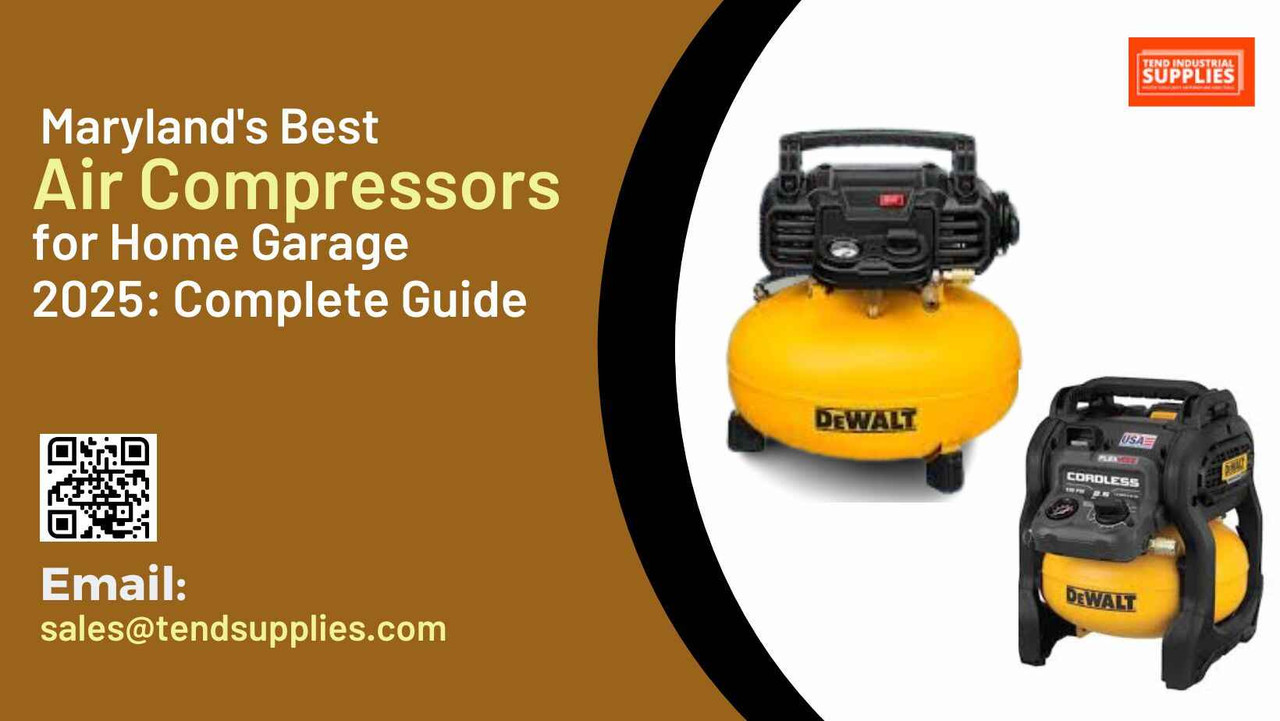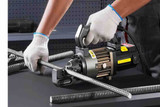Maryland's Best Air Compressors for Home Garage 2025: Complete Guide
Introduction
Setting up a home garage in Maryland comes with unique requirements, especially when it comes to finding the right air compressor. With Maryland's varied climate, from humid summers to chilly winters, having the right air compressor can ensure efficient work on projects ranging from tire inflation to powering heavy-duty tools.
This guide covers everything you need to know about selecting the ideal air compressor for your Maryland garage in 2025, including key considerations, recommended types, and the best models tailored to specific needs.
Key Considerations for Selecting an Air Compressor
When purchasing an air compressor, understanding a few core specifications can greatly improve your selection. Here are the main factors to keep in mind:
1. Power Requirements
Many Maryland homes have standard 120V outlets. If you’re aiming for a larger compressor that requires 240V, you may need additional electrical work in your garage.
Consider how much power your chosen tools need to avoid underpowering or overloading your compressor.
2. CFM (Cubic Feet per Minute)
CFM is a measure of the air volume a compressor can provide per minute. Tools like nail guns or staplers typically need around 2-3 CFM, whereas continuous-use tools like sanders may require 5 CFM or higher.
The higher the CFM rating, the better the compressor handles multiple tasks or extended operation.
3. PSI (Pounds per Square Inch)
PSI indicates the air pressure delivered. Most garage tools operate well at 90 PSI, but having a compressor with higher PSI capacity is beneficial, especially if you're using multiple tools in succession.
4. Tank Size and Portability
For light-duty tasks or infrequent use, a 3-6 gallon tank may be sufficient. Larger tanks, such as 20-30 gallons, offer more air storage, meaning the compressor doesn’t have to run as often during long jobs.
5. Noise Levels
Noise can be a consideration if your garage is attached to your home or in a residential neighborhood. Many air compressors now come with noise reduction features to keep decibels lower, which is particularly handy if you're working in close proximity to others.
Top Air Compressor Types for Home Garages
Understanding the different types of compressors can streamline your choice:
1. Portable Compressors
Portable compressors are compact and easy to move, making them great for smaller garages or those who need a tool they can easily store away. They work well for tasks such as inflating tires and running small air tools.
2. Single-Stage vs. Dual-Stage Compressors
Single-Stage Compressors: These units compress air once, reaching PSI levels around 125. Ideal for most home applications and tools.
Dual-Stage Compressors: Air is compressed twice, reaching up to 175 PSI. This type is more suitable for demanding or continuous tasks, making it a good fit for more extensive garages or small workshops.
3. Oil-Free vs. Oil-Lubricated Compressors
Oil-Free Compressors: Low-maintenance and quieter, oil-free compressors are excellent for indoor use.
Oil-Lubricated Compressors: These compressors require oil changes but offer a longer lifespan and are better for heavy, regular use, thanks to better durability and cooling.
Top Air Compressors Comparison 2025
| Model | Best For | Tank Size | Max PSI | CFM@90PSI | Noise Level | Price Range |
| VEVOR 3HP Professional | Overall Performance | 30 gal | 115 PSI | 11.8 CFM | 78 dB | $599-699 |
| California Air Tools 8010 | Quiet Operation | 8 gal | 120 PSI | 2.2 CFM | 60 dB | $399-499 |
| Shinano Industrial SI-25 | Professional Use | 60 gal | 135 PSI | 15.0 CFM | 82 dB | $899-999 |
| VEVOR 1HP Compact | Small Spaces | 6 gal | 115 PSI | 3.5 CFM | 65 dB | $299-399 |
| Green Keeper Ultra-Efficient | Energy Saving | 15 gal | 125 PSI | 4.0 CFM | 58 dB | $499-599 |
Maryland’s Top Air Compressor Picks for 2025
1. Best Overall Air Compressor
Description: This model is ideal for all-around use in Maryland garages, balancing capacity, noise control, and ease of maintenance.
Features: High PSI and CFM ratings, medium-sized tank for extended tasks, noise control mechanisms.
Ideal For: Running impact wrenches, nail guns, and paint sprayers without frequent stops.
2. Best Budget-Friendly Option
Description: A cost-effective yet reliable compressor suitable for beginners or those who don’t require frequent use.
Features: Lightweight, small tank capacity, manageable PSI and CFM for basic tasks.
Ideal For: Tire inflation, occasional use with light air tools, and basic DIY projects.
3. Best for High-Power Needs
Description: This model is built to power demanding tools consistently, with ample storage and high power output.
Features: Large tank, high PSI and CFM, oil-lubricated for durability.
Ideal For: Powering tools continuously, sanding, grinding, or extended work sessions in a home garage setting.
4. Most Compact & Portable Option
Description: This compressor is designed for ease of transport and storage, making it perfect for smaller garages or multi-use spaces.
Features: Lightweight, quick start-up, and medium PSI.
Ideal For: Small or medium-duty tasks, quick inflation needs, and areas with limited space.
5. Best Quiet Compressor
Description: Built with advanced noise control, this compressor is great for home garages in residential areas where noise is a concern.
Features: Silent operation, compact design, low CFM for smaller jobs.
Ideal For: Indoor projects or workspaces where minimizing noise is essential.
Seasonal Maintenance Guide
| Season | Temperature Range | Maintenance Focus | Frequency |
| Summer | 75-95°F | Moisture Control | Daily |
| Fall | 45-75°F | General Maintenance | Weekly |
| Winter | 25-45°F | Freeze Protection | Daily |
| Spring | 45-75°F | System Check | Weekly |
Maintenance Tips for Air Compressors in Maryland’s Climate
Maintaining an air compressor is essential, especially considering Maryland’s humid summers and colder winters. Here’s a seasonal approach to keep your compressor in optimal shape:
1. Spring & Summer: Preventing Moisture Buildup
Drain the Tank Regularly: Maryland's humidity can lead to condensation in your compressor tank. Draining it after each use prevents rust and corrosion.
Inspect Filters: Check air intake filters to ensure they’re clean. Clogged filters strain the compressor and reduce efficiency.
Oil Levels: For oil-lubricated models, monitor and top up oil levels as needed, particularly during high-use seasons.
2. Fall: Preparing for Winter Downtime
Empty the Tank Fully: If you don’t plan to use your compressor over the winter, fully drain the tank and wipe down any moisture.
Lubricate Moving Parts: Ensure parts that need lubrication are well-oiled to prevent seizing in colder weather.
Cover the Unit: Use a protective cover if your compressor is stored in an unheated area to shield it from temperature fluctuations.
3. Winter: Cold Weather Considerations
Warm-Up Period: Start the compressor and allow it to warm up before use, as cold temperatures can thicken oil and impact performance.
Check Seals: Inspect all seals for wear or cracking due to the cold, replacing them as necessary.
Regular Use: If possible, run your compressor occasionally during winter to prevent moisture buildup and keep parts moving.
Frequently Asked Questions
1. How do I know which CFM rating is suitable for my tools?
Check your tools’ manuals for CFM requirements. Add 20-30% to that figure to account for future tools or simultaneous use.
2. What’s the difference between oil-free and oil-lubricated compressors?
Oil-free compressors are low maintenance and quieter, ideal for home garages. Oil-lubricated models are more durable, suitable for frequent or heavy-duty work but require periodic oil changes.
3. How loud is a typical air compressor?
Decibel levels range from 60-90 dB. For residential areas, look for models with sound reduction features.
4. Can I use a portable air compressor for all my garage tools?
Yes, as long as the CFM and PSI match your tool requirements. However, smaller tanks may require more frequent restarts.
5. Is it worth investing in a quiet compressor?
If noise is a concern, particularly in residential areas, investing in a quiet compressor enhances comfort and reduces disturbance.
Conclusion
For more details on finding the best air compressor for your Maryland garage and to explore top models, check out the Tend Industrial Supplies catalog here. Whether you're setting up a new home workshop or upgrading your existing tools, we have options to suit every need and budget. Visit our site or contact us for expert recommendations!
Related Articles
The Ultimate Guide to Choosing the Best Air Compressor for Your Home Garage in 2025
Air Up Your DIY Projects: The Ultimate Guide to Portable Air Compressors for Your Home Garage









